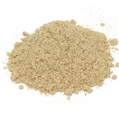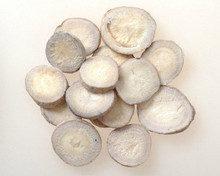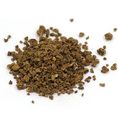 Loading... Please wait...
Loading... Please wait...- Home
- Bulk Herbs
- Herbs (W-Z)
- White Peony Root
- Home
- Herbs - Certified Organic
- U-W
- White Peony Root
Product Description
White Peony Root
Also Known As – Paeonia lactiflora
Certified Organic USA
Overview - Peony is a plant. The root and, less commonly, the flower and seed are used to make medicine. Peony is sometimes called red peony and white peony. This does not refer to the color of the flowers, which are pink, red, purple, or white, but to the color of the processed root.
Medicinal Uses - Peony is used for gout, osteoarthritis, fever, respiratory tract illnesses, and cough. Women use peony for menstrual cramps, polycystic ovary syndrome, premenstrual syndrome (PMS), and for starting menstruation or causing an abortion. It is also used for viral hepatitis, liver cirrhosis, upset stomach, muscle cramps, “hardening of thearteries” (atherosclerosis), and to cause vomiting. Peony is also used for spasms,whooping cough (pertussis), epilepsy, nerve pain (neuralgia), migraine headache, and chronic fatigue syndrome (CFS).
People apply peony to the skin for healing cracked skin, especially cracks around theanus (anal fissures) that sometimes occur with hemorrhoids.
Peony Root Uses:
- Skin wrinkles. Peony contains a chemical called paeoniflorin. Early research suggests that applying a specific cosmetic product containing 0.5% paeoniflorin for 8 weeks might reduce facial wrinkles.
- Muscle cramps.Early research suggests that taking a specific combination of peony and licorice (Shakuyaku-kanzoh-to) might ease muscle cramps in people with liver cirrhosis and in people undergoing hemodialysis.
- Rheumatoid arthritis (RA). Early research suggests that taking a product containing peony along with the drug methotrexate for 3 months might reduce test markers of swelling in people with RA better than taking methotrexate alone. However, taking this peony product with methotrexate does not appear to improve symptoms of RA better than methotrexate alone.
- Gout.
- Osteoarthritis.
- Breathing problems.
- Cough.
- Skin diseases.
- Hemorrhoids.
- Heart trouble.
- Stomach upset.
- Spasms.
- Nerve problems.
- Migraine headache.
- Chronic fatigue syndrome (CFS).
Parts Used – Root, dried and chopped or powdered.
Precautions - Peony is SAFE when used by mouth, short-term. Peony has been used safely for up to 4 weeks. It can cause stomach upset. It can cause rash when it comes in contact with the skin of sensitive people.
Special Precautions & Warnings: Pregnancy and breast-feeding: Peony is POSSIBLY UNSAFE when taken by mouth during pregnancy. Some developing research suggests that peony can cause uterine contractions. However, other research suggests a combination of peony and angelica might be safe. Until more is known, don’t use peony if you are pregnant. Also avoid peony if you are breast-feeding. Not enough is known about the safety of using peony if you are nursing.
Bleeding disorders: Because peony might slow blood clotting, there is a concern that it might increase the risk of bleeding in people with bleeding disorders. Don’t use it if you have a bleeding disorder.
Surgery: Peony might slow blood clotting, so there is a concern that it could increase the chance of bleeding during and after surgery. Stop using peony at least 2 weeks before a scheduled surgery.
Preparation - Teas, tinctures, encapsulations, almost always used with other herbs.
Disclaimer - These products are not intended to diagnose, treat cure or prevent any disease. Reviews are not intended as a substitute for appropriate medical care or the advice of a physician or another medical professional. Actual results may vary among users. Mountain Maus Remedies LLC makes no warranty or representation, expressed or implied, as to the accuracy or validity of the information contributed by outside product review submissions, and assumes no responsibility or liability regarding the use of such information. The information and statements regarding the dietary supplements have not been evaluated by the Food and Drug Administration. If you have a medical condition or disease, please talk to your health care provider. If you are currently taking a prescription medication, you should work with your health care provider before discontinuing any drug or altering any drug regimen, including augmenting your regimen with any herb or dietary supplements. Do not attempt to self-diagnose any disease or ailment based on the reviews and do not use the information contained herein for diagnosing or treating a health problem or disease. Proper medical care is critical to good health. If you have a health concern or suspect you have an undiagnosed sign or symptom, please consult a physician or health care practitioner.
© Mountain Maus Remedies. All Rights Reserved
Information obtained from WebMD
















